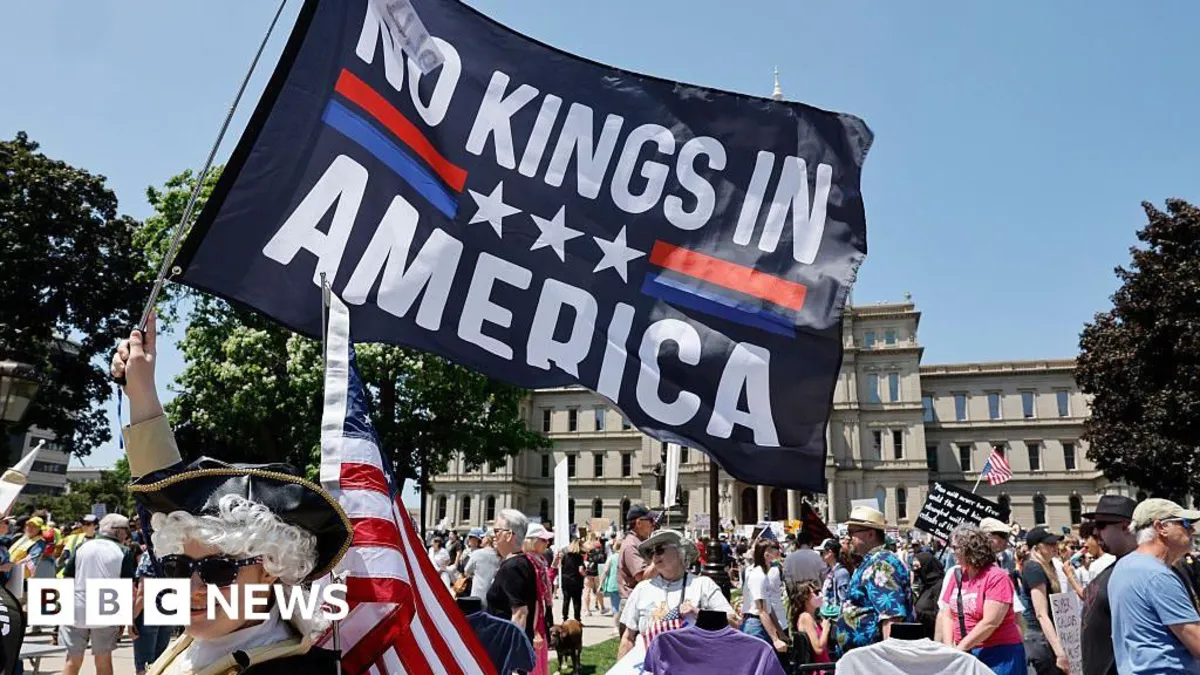
Across the United States, thousands of individuals gathered to participate in protests against President Donald Trump, just hours before his much-anticipated military parade in Washington, D.C. These demonstrations, organized by the grassroots coalition known as No Kings, were characterized as a nationwide day of defiance against Trump's policies and governance.
Rallies took place in prominent cities including New York, Philadelphia, and Houston, where lawmakers, union leaders, and activists delivered impassioned speeches to crowds brandishing American flags and signs critical of Trump. The military parade, set to occur on Saturday evening, commemorates the 250th anniversary of the U.S. Army and coincidentally falls on Trump's birthday. In anticipation of the protests, Trump issued a stern warning that demonstrators would be met with "very big force."
Several politicians and former military leaders have openly criticized the parade, labeling it a politicization of the U.S. military. This sentiment resonates with many Americans who feel that the event serves more as a personal celebration for Trump than a genuine tribute to the armed forces.
In Los Angeles, California, local leaders and law enforcement remained vigilant following a previous week filled with protests against a series of immigration raids. While most protests were peaceful, some escalated into violence, resulting in vehicles being set on fire. In response, Trump deployed the state's National Guard despite the objections of Governor Gavin Newsom.
The No Kings movement derives its name from the criticism that Trump has overstepped the boundaries of presidential power during his second term. His early executive orders, mass firings of federal employees, and abrupt deportations have led to numerous lawsuits asserting that his administration has violated the U.S. Constitution and various legal protocols.
In Minnesota, planned demonstrations were unfortunately canceled following a tragic incident that resulted in the death of a state lawmaker and her husband, while another lawmaker sustained injuries in a shooting. This event cast a shadow over the protests, emphasizing the serious issues at stake, including immigration and the overall effectiveness of the federal government.
Despite the somber atmosphere, many took to the streets in Los Angeles to participate in a local No Kings march. Elidia Buenrostro, 29, expressed her determination to advocate for her undocumented family members, holding a sign that read "families belong together." At the Philadelphia rally, 61-year-old nurse Karen Van Trieste voiced her concerns about Trump's staffing cuts to the Centers for Disease Control, a crucial public health agency.
Some protesters creatively expressed their sentiments through costumes, drawing inspiration from popular culture. For instance, Jaqueline Sacrona and her daughters attended a protest in Michigan dressed as characters from Margaret Atwood's The Handmaid's Tale, symbolizing their concerns about reproductive rights under Trump's administration. In another display, Dennis Hannan in Philadelphia donned an Elvis Presley costume, humorously declaring that the late rock 'n' roll icon was "the only American King" and that they were there to "downplay any other kings."
The No Kings protests reflect a broader resistance against perceived authoritarianism and a strong desire to defend democratic values. As citizens voice their concerns, the national discourse surrounding Trump's presidency continues to evolve, highlighting the importance of civic engagement and the mobilization of grassroots movements across the nation.